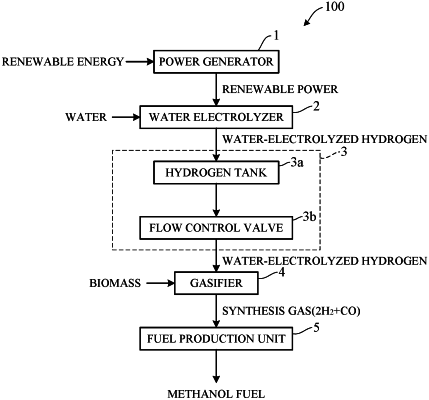| CPC C25B 15/02 (2013.01) [C07C 29/1518 (2013.01); C25B 1/04 (2013.01); C25B 15/081 (2021.01); B01J 19/004 (2013.01); B01J 19/245 (2013.01); B01J 2219/0004 (2013.01); C10J 2300/1665 (2013.01); C10J 2300/1684 (2013.01); Y02E 60/36 (2013.01); Y02P 20/133 (2015.11)] | 5 Claims |

|
1. A fuel production system, comprising:
a synthesis gas generation unit configured to generate synthesis gas containing hydrogen and carbon monoxide from carbon-containing raw material;
a fuel production unit configured to produce fuel from the synthesis gas generated by the synthesis gas generation unit;
a water electrolyzer configured to electrolyze water to generate water-electrolyzed hydrogen;
a hydrogen supply unit configured to supply the water-electrolyzed hydrogen generated by the water electrolyzer to the synthesis gas generation unit; and
a controller including an arithmetic unit and a storage unit, wherein
the controller is configured to perform:
calculating an input energy based on a first energy possessed by the carbon-containing raw material, a second energy consumed by the water electrolyzer when generating the water-electrolyzed hydrogen, a third energy consumed by the synthesis gas generation unit when generating the synthesis gas, and a fourth energy consumed by the fuel production unit when producing the fuel;
calculating a recovered energy based on a fifth energy possessed by the fuel produced by the fuel production unit;
monitoring whether an electrolysis efficiency of the water electrolyzer is equal to or higher than a predetermined electrolysis efficiency in which a ratio of the recovered energy to the input energy increases as compared with a case where the water-electrolyzed hydrogen is not generated and supplied; and
controlling the water electrolyzer so as to generate the water-electrolyzed hydrogen when the electrolysis efficiency is equal to or higher than the predetermined electrolysis efficiency.
|